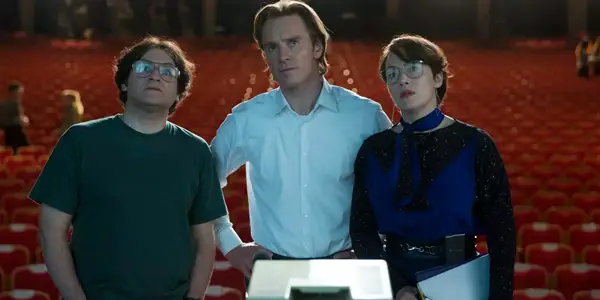STEVE JOBS And The Current State Of The Biopic

Alex is a 28 year-old West Australian who has a…
“Based on a true story.” “Based on true events.” “Inspired by actual events.” “Ripped from the headlines.” Here lie a series of tag-lines so overused that even mainstream audiences can spot the deception at first glance. These phrases are marketing concepts used to exhaustion by every two-bit horror film trying to garner some attention. Subconsciously everyone knows when watching a film that everything being seen is false.
Storytelling presents a pretty façade – created by directors and producers who puppeteer a narrative to sell the illusion of a reflected reality – where boring stuff is cut out and life has formidable beginnings and endings. So, when a film is based on true events, does it really matter?
It has been countlessly revealed that the real story in the awesome movie you just saw never actually happened the way it was portrayed and the characters you rooted for were simply invented for cinematic easiness. The question is, when the line between echoed reality and fiction is increasingly blurred – where does the buck end? What does this mean for the nature of the ‘true story’?
Biographies and Postmodernist Cinema
The idea of the biographical film is one rooted in postmodernist cinema. Postmodernist film attempts to subvert mainstream conventions of both narrative structure and characterisation while testing the audience’s suspension of disbelief. When based on true events, the film plays with this disbelief by presenting the audience with the simple fact that the events in the story took place in reality.
You might think this is wrong or crazy, but by presenting the cinematic events as factual occurrences, an audience is prone to remove any doubt that surfaces along the way. This indication – presented as evidence – allows the filmmakers to distort facts to their liking in a manner much more forgivable.
Filmmakers manage to get away with blatantly lying to audiences by usually adding the coda at the end of the film; offering us pictures and videos of the people upon which these films are based. This offers context to the actual story and provides a sense of closure that attempts to shut off the audiences’ curiosity into the actual stories behind these films.
Through the maneuver of a broad conclusion, the desire to read further into the actual events effectively stops. Cinema allows the construction of heroes and villains within Hollywood-esque plots which remove any form of defense or argument from those it depicts.

This idea is most prevalent in Danny Boyle’s detached Steve Jobs, where John Sculley, the man who took over Apple when Steve Jobs was fired in the 90’s (played by Jeff Daniels), is shown to be a power-hungry businessman who was a complete failure without Steve Jobs. The film’s narrative depicts that after John Sculley forced Jobs to leave the company (one of the only scenes in the film which holds the most fact), he created the Apple device, “Newton,” a small electronic notebook.
The film shows this move as a complete failure and a major component in Apple’s infamous business decline. In manner usually seen in a political Youtube clip, the film uses a satirical Simpsons scene and simplistic cartoonish symbols to point out Newton’s lack of success and brand Sculley as a complete loser. This is a key example in highlighting the difference between cinematic perception and historical fact: the Newton wasn’t the monumental flop that the film depicts, rather, a minor misfire during a bad period in Apple history.
Whilst it may seem cumbersome to go into the technical details behind Apple’s collapse, to blindly label a true life figure as a bumbling antagonist is blatantly manipulating fact to serve a story-telling agenda. In order to fit into Danny Boyle’s intended narrative, the filmmakers dumbed down the facts into easy-to-digest fiction. Moves like this twist history and contribute to the public image of John Sculley.
John Sculley did comment positively about the film despite its poor treatment of him. Whilst it won’t significantly impact his reputation more than Walter Isaacson’s biography or general water-cooler discussion, it’s another piece of media that perpetuates a skewed perspective on historical events.
Previous documentaries about Jobs (Steve Jobs: Man in the Machine, IGenius, and Joshua Michael Stern’s 2012 biopic Jobs) also portrayed Sculley in a negative light. There is never truly a “true” history when it comes to a story like this due to perspectives clashing and personal viewpoints that are always going to be different. However, these films have helped shape this reality into a definitive history for general audiences.
Steve Jobs and the Manipulation of Fact
Thanks to the terrific acting by Michael Fassbender in the key role, audiences connect with his controlling character even when he is fighting those around him. The film portrays the titular tech giant as an egotistical genius whose key weakness was his inability to connect with those around him.
Despite what you think of the film, this particular demonstration of Steve Jobs becomes a part of your pop culture understanding of who he was through one person’s biased perspective. Even if he was considered evil or god-like in other peoples eyes, the public perception of Jobs has added another conflicting point of view by Danny Boyle and Aaron Sorkin, who, judging by the film’s analysis, weren’t exactly huge fans of the man personally.

Steve Jobs is portrayed in a theatrical and majestic way, thus making the audience slightly aware that the scenes and conversations never occurred at all or in the manner done so on-screen. The general thematic ideas that the film is selling is one that will have a definitive impact on those watching. The depiction that Jobs was a controlling megalomaniac will always exist somewhere in the pop culture fringe now, much like any significant pop culture symbols/narrative created by cinema.
Steve Jobs is a film that invents character interactions, removes key story details, shifts timelines for convenience. Characters are presented in an objectionable manner which creates clear ‘good guys’ and ‘bad guys’ based on real people. The degrees of separation between the audience’s understanding of Jobs’ life are so far apart that any type of tangible fact is completely lost – shedding the film of any stable factual backbone.
The film is based upon a biography by Walter Isaacson, which was a third party account on Jobs’ life. Steve Jobs is a A third party account based upon another third party account, and is now being delivered to audiences under the guise of being fact. Despite this, audiences will ingest it completely due to one thing: someone or something (usually the movie poster) told them it was based on a true story.
The lack of truth in “true” storytelling poses the question: why rely on “fact” at all? If the story changes and shifts so much, why not simply continue to make up stuff in order to tell a more original story? Simply using historical characters in a new setting to deliver a more satisfying film is simply not original.
This brings up the idea of Hollywood as the people who can literally re-write history and change the mainstream understanding of past events. How many people do you think the events of Argo actually happened that way? That Ben Affleck and his crew of scared Americans flew off in an airplane being chased by a terrorist-filled truck who angrily shook their fists at the departing airplane?
The Audience is the Final Word
One main question is to ask why: why are mainstream audiences considered more willing to watch a film if its apparently based on a true events or inspired by actual events? Is it something that audiences truly crave or is it a marketing tagline that happened, by coincidence, to be associated with a string of successful films and marketing people are too scared to shed the idea?
The simple solution is that audiences just do not realise nor do they care about the distinction between reality being presented on-screen and how they applies to real life. Whilst the idea of a film being a true story buys some legitimacy when engaging with a narrative, several examples, including Steve Jobs, highlight that audiences will observe these marketing tactics and purely buy them on face value. Another huge film that blatantly lied to its audience under the facade of a true story is Clint Eastwood’s huge mainstream hit: American Sniper.
American Sniper was a hugely successful film which was based upon a real person – Chris Kyle – but apart from that, created entirely fictional antagonists and situations. This was bought by most mainstream audiences who were unaware of the actual events. The idea that Kyle confronted a child-torturing terrorist is a concept that many people will know associate with Chris Kyle’s story, even if it was one invented in order to personify a nameless conflict that Kyle fought.
Even upon the initial release of his book, Kyle’s accounts of war where frequently criticised and their legitimacy was debated due to his fractured PTSD mental state and conflicting reports. Due to the film being a huge box office success, the result of the film’s widespread awareness started to effect real life affairs, as whilst the film was still out in cinemas, Chris Kyle’s murder trial was still happening. Lawyers cited that trying to find a jury of unbiased people was extremely hard as people either had read his book or seen the movie and thus would’ve been influenced heavily by the material.

One noteworthy point: no matter what exaggerated tales are told or manipulative biographical films being seen, the true story will always trump fiction. The basis of reality and the relatable quality that it brings to film will always harbour a powerful authenticity to the narrative at hand. Ultimately, audiences simply don’t care about true stories in feature films. Audiences, whether consciously or not, want fiction because it ultimately does the main job of a film: to deflect our attention from reality in the most effective way.
The Introduction of Truth
The prevalence of reality within fiction is an interesting concept explored within Adam McKay’s fourth-wall breaking The Big Short. Based upon Michael Lewis’ 2010 book of the same name, The Big Short is a satirical look at the 2007-08 economic housing crisis through the viewpoints of four intersecting protagonists.
Due to the film’s dense material (being a technical analysis of how these people financially benefited off the housing crisis), the film couldn’t simplify its information for the sake of a mainstream audience. The Big Short utilises a variety of different cinematic experiments in order to convey this data to the audience. Celebrity cameos, title cards, characters directly addressing the camera and its documentary-style aesthetics are used in the film to present a stable and genuine reality.
Whilst it’s not focused on a single person’s history like Steve Jobs or American Sniper, The Big Short is still a third party account on real life figures. It goes out of its way to try and insert reality within a fictional world, which can be quite jarring for some audience members. Whilst The Big Short is successful in its approach due to McKay’s comedic instincts, it also highlights the problem with trying to convey truth too heavily within cinema. Sadly, reality is often far more boring than cinema makes it out to be, or far too complex to put into one two-hour film.
A director’s singular vision of a true story shapes the access of the truth within the narrative, as they navigate the process of removing or adding any narrative elements that they see fit. Unfortunately, the fate for many people’s histories lie in the hands of those who choose to tell their story. No matter how close or distant from the original source material a film may be, simply slapping on a, “true story,” tag-line and pointing to the historical backbone allows filmmakers to blatantly create a new alternative history – a newly constructed reality that diverts audiences to a different perspective on a definitive subject.
Danny Boyle’s Steve Jobs forms a highly biased and damning character analysis of the heavily reported titular tech giant. Due to the social media age, audiences are now more aware then ever that simply saying, “Based on a true story,” doesn’t make it so.
So, why do audiences still go for them? At the end of the day, no matter how close or far they are, they are purely fiction and should be treated as such. If a great biographical film simply points you towards a really terrific true story, then there is nothing wrong with that.
How do you feel about biopics, and the use of the “based on a true story” tag-line? Share your thoughts in the comments below.
Does content like this matter to you?
Become a Member and support film journalism. Unlock access to all of Film Inquiry`s great articles. Join a community of like-minded readers who are passionate about cinema - get access to our private members Network, give back to independent filmmakers, and more.













